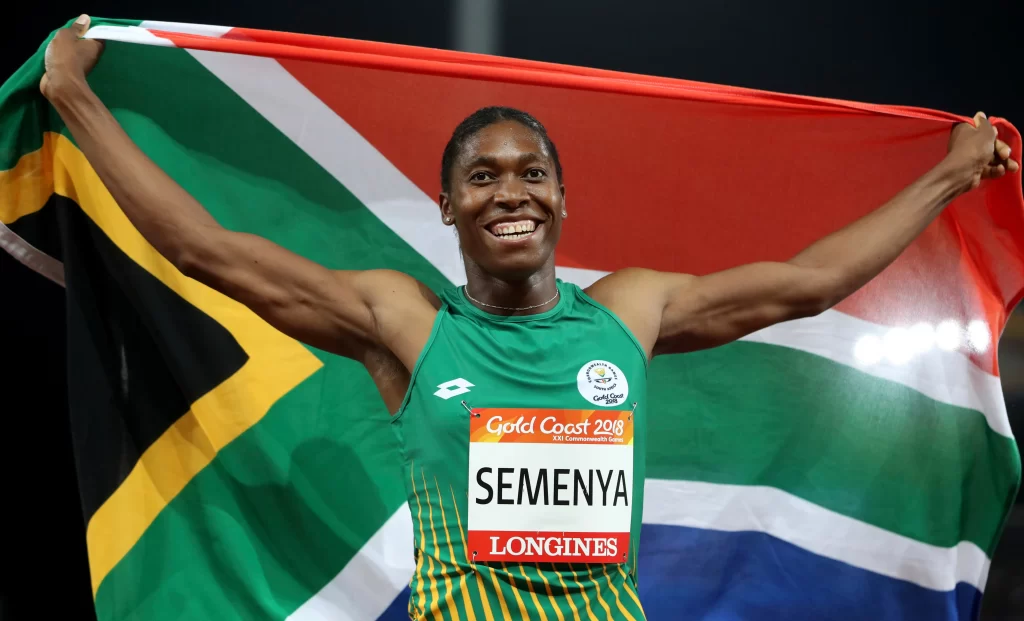Court to issue verdict on Semenya’s sex eligibility rule that banned her
3 min read
Caster Semenya during an earlier race. Her ongoing legal case could reshape how international sports handle sex eligibility rules.
European Court to Rule on Semenya’s Eligibility Battle Over Testosterone Regulations
A landmark ruling is expected this week from the highest chamber of the European Court of Human Rights (ECHR), which could revive South African runner Caster Semenya’s legal battle against the sex eligibility rules that effectively ended her athletic career.
The decision, due Thursday, could uphold a 2023 ruling in Semenya’s favor, placing new pressure on global sports bodies—particularly World Athletics—to reassess policies that require some female athletes to lower their natural testosterone levels to compete. The outcome may have widespread implications for sports worldwide.
Challenge to Sex Eligibility Rules
Semenya, a two-time Olympic champion in the 800 meters, was barred from competing after refusing to take hormone-suppressing medication mandated by World Athletics rules introduced in 2018. These regulations target female athletes with Differences of Sex Development (DSDs), a group of rare conditions that result in higher-than-average testosterone levels.
The governing body argues that these athletes enjoy an unfair advantage, comparable to male competitors. Semenya has consistently rejected this, stating that her abilities are a natural gift and not a form of doping. “It’s not about competing anymore. It’s about protecting athletes’ rights,” she said recently.
The Grand Chamber of the ECHR, composed of 17 judges, will decide whether the 2023 ruling that found Semenya had been discriminated against should stand. If so, her case may be sent back to Swiss courts for further legal proceedings, potentially challenging the regulations on a broader scale.
Career Derailed by Regulation
Semenya’s dominance in women’s middle-distance running came under scrutiny in 2009 when she won the 800-meter world title as a teenager. She was immediately subjected to sex verification tests, even though she was assigned female at birth, raised as a girl, and has always identified as a woman.
Despite not being transgender, Semenya’s condition—now classified as a DSD—has made her a central figure in the global debate about sex and fairness in sports. Her case has been repeatedly misunderstood, often conflated with transgender participation in women’s categories.
After losing legal battles at the Court of Arbitration for Sport in 2019 and Switzerland’s Supreme Court in 2020, Semenya scored her first major legal victory at the ECHR in 2023. That ruling found her rights were violated and raised serious questions about the health risks of forced hormone suppression.
Potential Global Impact

While Thursday’s ruling will not directly overturn World Athletics’ rules, a favorable decision would allow Semenya’s challenge to continue and could serve as a precedent for other athletes affected by similar policies.
Other Olympic sports such as swimming and boxing have adopted similar testosterone-based eligibility rules, while football’s governing bodies are currently reviewing theirs. The International Olympic Committee (IOC), now under the leadership of President Kirsty Coventry, is also facing mounting pressure to offer clearer guidance.
Coventry has suggested the IOC should lead on the issue rather than leaving it to individual sports federations. Many observers say a unified policy is needed to avoid confusion and inconsistent application across different disciplines.
In recent years, other controversies have emerged. At the Paris Olympics, two female boxers—Algeria’s Imane Khelif and Taiwan’s Lin Yu-ting—faced scrutiny over eligibility, prompting boxing authorities to introduce new sex verification measures.
A Fight Beyond the Track
Although Semenya has not raced internationally since 2019, she has continued her advocacy and moved into coaching. She has made it clear that her legal pursuit is now about principle, not medals.
“This is a human rights issue,” she told a South African publication last month. “It’s about making sure no other athlete is put through what I’ve experienced.”
The outcome of Thursday’s ruling could redefine how sports organizations around the world approach sex and eligibility—marking either a turning point for inclusion or the end of Semenya’s long legal journey.






1 thought on “Court to issue verdict on Semenya’s sex eligibility rule that banned her”